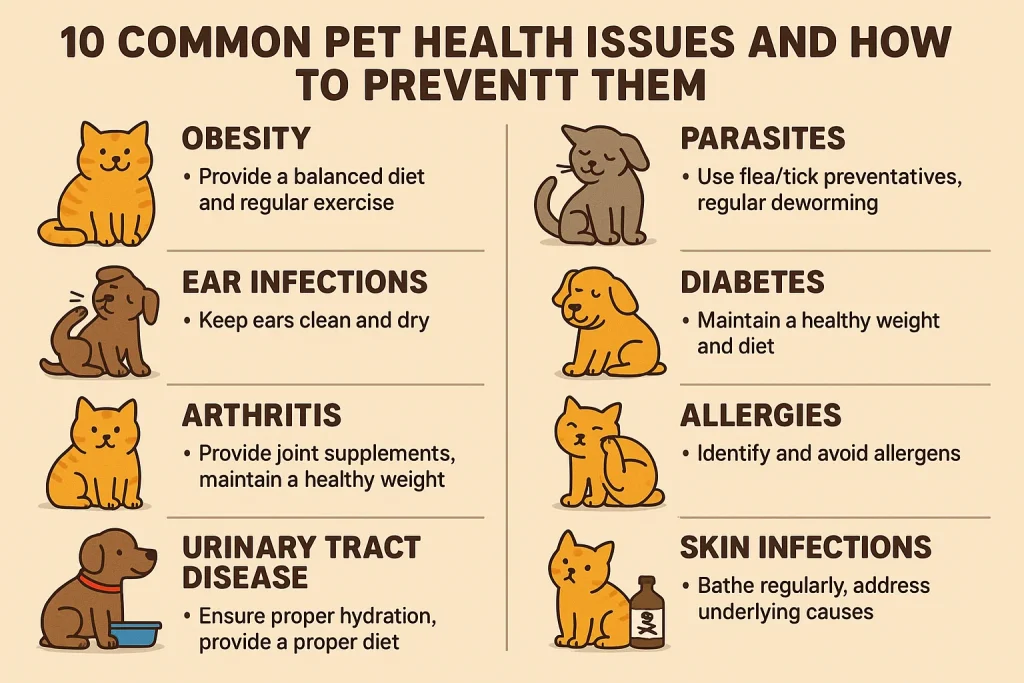As pet owners, we all want our furry companions to lead healthy, happy lives. However, just like humans, pets can experience a range of health issues that require attention and care. Being aware of these common pet health problems and knowing how to prevent them can go a long way in keeping your pet safe and well.

1. Obesity
Obesity is a growing problem among pets, particularly dogs and cats. Overfeeding, lack of exercise, and an improper diet are the primary causes. Obese pets are at risk for diabetes, heart disease, and joint problems.
Prevention:
- Control portion sizes and avoid giving too many treats.
- Provide regular exercise, like daily walks or playtime.
- Consult with your vet about an appropriate diet and monitor your pet’s weight regularly.
2. Fleas and Ticks
Fleas and ticks are common external parasites that can lead to itchy skin, allergic reactions, and even transmission of diseases such as Lyme disease and flea anemia.
Prevention:
- Use flea and tick prevention treatments such as topical applications, collars, or oral medications.
- Regularly check your pet for signs of fleas and ticks, especially after outdoor activities.
- Maintain a clean living environment, vacuum regularly, and wash pet bedding.
3. Dental Problems
Dental disease, such as tartar buildup and gum disease, is widespread in pets. Without proper care, dental issues can lead to tooth loss and affect your pet’s overall health.
Prevention:
- Brush your pet’s teeth regularly with pet-safe toothpaste.
- Provide dental chews or toys that help reduce plaque and tartar.
- Schedule annual veterinary check-ups to monitor oral health.
4. Ear Infections
Ear infections are common in dogs, especially those with floppy ears or those who spend a lot of time in the water. These infections can lead to pain, itching, and even hearing loss if untreated.
Prevention:
- Keep your pet’s ears clean and dry.
- Avoid water from getting in your pet’s ears after baths or swimming.
- Regularly check for signs of ear infections, such as redness, odor, or discharge.
5. Allergies
Pets, particularly dogs and cats, can suffer from allergies to food, pollen, dust mites, or fleas. These allergies can cause itching, skin rashes, and respiratory issues.
Prevention:
- Identify and avoid known allergens. If necessary, consult with a vet for allergy testing.
- Keep your home free of dust and use air purifiers.
- Use hypoallergenic shampoos and pet food if allergies are suspected.
6. Arthritis
Arthritis is a common condition in older pets, particularly large dog breeds. It can cause pain, stiffness, and reduced mobility.
Prevention:
- Maintain a healthy weight to reduce stress on joints.
- Provide joint supplements, such as glucosamine, after consulting with your vet.
- Regular exercise and low-impact activities like swimming can help improve joint health.
7. Skin Problems
Skin issues, such as hotspots, dry skin, or infections, are common in pets. These can be caused by allergies, infections, or parasites.
Prevention:
- Regularly groom your pet to keep their skin and coat in good condition.
- Ensure your pet’s diet includes omega-3 fatty acids, which promote healthy skin.
- Treat and prevent external parasites such as fleas and ticks.
8. Urinary Tract Infections (UTIs)
UTIs are common in cats and dogs, leading to discomfort, frequent urination, and blood in the urine.
Prevention:
- Ensure your pet has access to fresh water at all times.
- Regularly take your pet for vet check-ups to monitor urinary health.
- Maintain proper hygiene, especially for female pets and pets with long hair.
9. Separation Anxiety
Many pets experience separation anxiety, particularly when left alone for extended periods. Symptoms can include destructive behavior, excessive barking, and even house soiling.
Prevention:
- Gradually train your pet to be comfortable being alone by starting with short periods of separation.
- Provide toys or puzzle feeders to keep your pet mentally stimulated when you’re away.
- Consider crate training to create a safe, secure space for your pet.
10. Gastrointestinal Issues
Gastrointestinal problems, such as vomiting, diarrhea, or constipation, can be caused by a variety of factors, including poor diet, stress, or infections.
Prevention:
- Feed your pet a balanced diet that suits their age, size, and breed.
- Avoid feeding your pet table scraps, which can upset their stomach.
- Regularly deworm your pet and ensure their vaccinations are up to date.
By staying vigilant and proactive about your pet’s health, you can help them live a longer, happier life. Regular vet check-ups, proper nutrition, and exercise are the keys to preventing many common health issues. If you notice any signs of illness in your pet, don’t hesitate to consult your veterinarian for advice and treatment.
Leave a Reply